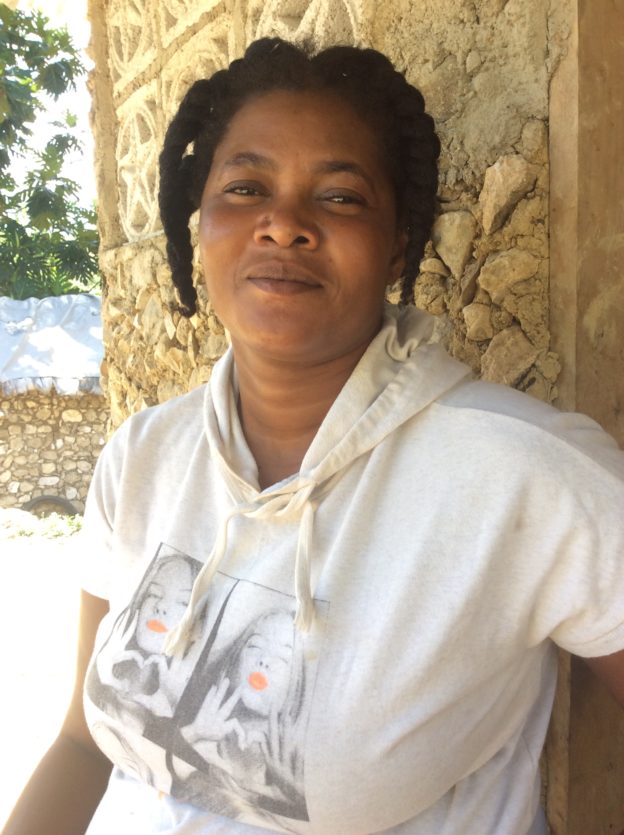I’ve written about Rose Marie before. (See here.) She was part of a cohort of 360 CLM families who graduated from the program in December 2014. At the time, she was living in Fon Cheval. She and her partner, Emmanuel, had moved out of the house farther down the hill she built with the CLM program’s help.
The move was a struggle because she was still nursing her twins, the couple’s third and fourth children, but they wanted to move because they felt that there was something wrong with the neighborhood in Nan Siwèl they were living in. The livestock the couple had been accumulating since they joined the program was dying off, mysteriously the way Rose Marie saw things. When her prized possession, the cow she had been saving for, died suddenly, she made the decision. With four small children, she didn’t feel as though she could take any chances.
But the losses had accumulated, and she found herself almost having to start all over again. Fortunately, the couple had some income nonetheless. Emmanuel had found work in one of the mines near Fon Cheval that provides sand for construction. While on the job, he also sold cellphone minutes. Rose Marie wasn’t getting around much. The twins gave her more than enough to do.
She eventually joined Fonkoze’s credit program. The center was a little bit of a hike from Fon Cheval, but many of the women were CLM graduates. So, though she was new to the neighborhood, she felt comfortable with the group. But she dropped out of the program after her second loan. She just didn’t think it was working for her. The nearest larger market was in Labasti, and the cost of the transportation there and back made her profit margin too low. “If you don’t bring 50 gourds home at the end of the day, it isn’t worth it.”
Rose Marie continued to get by even so. The yard she had moved out of now belonged, in part, to her. It was her late mother’s land. And it’s full of fruit trees: mangoes and breadfruit especially. Once she had had to leave that harvest for others, but eventually she could use it. She would hike down when the fruit was ripe, and pick some to sell in the market. The fruit is valuable. A single tree could bring her 2500 gourds, and between that and what Emmanuel was earning they kept the children fed and sent the older ones to school.
But the more time she spent in Fon Cheval, the less she liked it. “There’s no water up there, and I didn’t have a cistern. The kids were going around in dirty clothes because I couldn’t do the laundry.” She also noticed that her brother, who lives in the same yard that she had moved away from, was keeping livestock without any trouble. So she decided to return to the yard. At about the same time, she and Emmanuel were having difficulties in their relationship, and he left. “He doesn’t get along with people. He was always wanting to fight with my brother, and when they started drawing their machetes, it was time for him to go.”
She and her children moved in with her brother while she began building a new home. She had saved the roofing from her CLM house, and the yard had lumber that she could use for the frame. It has taken some time, but the roof and the walls are up. It still needs a door, and the front porch needs a ceiling, but she has the lumber she needs already, so it is just a matter of the builder’s finding the time.
She’d like to return to small commerce. She’ll sell groceries at the nearby market called “Ti Sekèy,” or Little Coffin, and in Labasti and Sodo, too. But she’s not ready yet. “I can’t have a commerce until my home is finished. I need someplace to keep merchandise.”
In the meantime, she gets by selling fruit from the trees that she and her brother have. Emmanuel sometimes calls, but he doesn’t send money. Occasionally his former employer does, but for the most part she is on her own. The fruit keeps them fed, and it enabled her to send all four kids to school this year. She also started to buy livestock again. “If you see me with 1000 gourds, you can be sure I’m investing 500.” Right now, she just keeps poultry, but her plan is to start buying larger animals, like goats and pigs, too.
